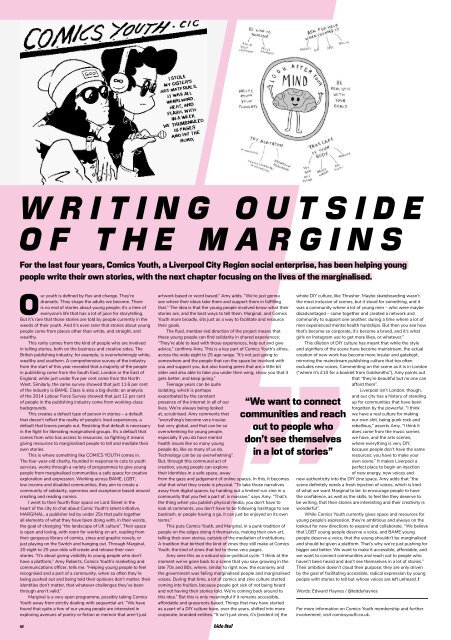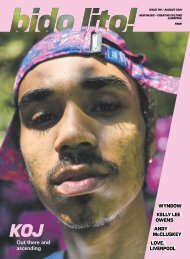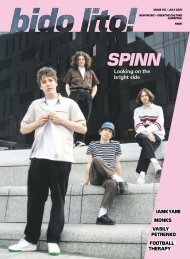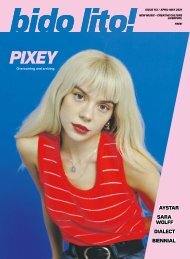Issue 104 / October 2019
October 2019 issue of Bido Lito! magazine. Featuring: STRAWBERRY GUY, MARVIN POWELL, COMICS YOUTH, RICHARD HERRING, BRADLEY WIGGINS, ENNIO THE LITTLE BROTHER, EDWYN COLLINS, SKELETON COAST, WAND, FUTURE YARD and much more.
October 2019 issue of Bido Lito! magazine. Featuring: STRAWBERRY GUY, MARVIN POWELL, COMICS YOUTH, RICHARD HERRING, BRADLEY WIGGINS, ENNIO THE LITTLE BROTHER, EDWYN COLLINS, SKELETON COAST, WAND, FUTURE YARD and much more.
Create successful ePaper yourself
Turn your PDF publications into a flip-book with our unique Google optimized e-Paper software.
WRITING OUTSIDE<br />
OF THE MARGINS<br />
For the last four years, Comics Youth, a Liverpool City Region social enterprise, has been helping young<br />
people write their own stories, with the next chapter focusing on the lives of the marginalised.<br />
Our youth is defined by flux and change. They’re<br />
dramatic. They shape the adults we become. There<br />
is no end of stories about young people; it’s a time of<br />
everyone’s life that has a lot of juice for storytelling.<br />
But it’s rare that those stories are told by people currently in the<br />
weeds of their youth. And it’s even rarer that stories about young<br />
people come from places other than white, and straight, and<br />
wealthy.<br />
This rarity comes from the kind of people who are involved<br />
in telling stories, both on the business and creative sides. The<br />
British publishing industry, for example, is overwhelmingly white,<br />
wealthy and southern. A comprehensive survey of the industry<br />
from the start of this year revealed that a majority of the people<br />
in publishing come from the South East, London or the East of<br />
England, while just under five per cent come from the North<br />
West. Similarly, the same survey showed that just 11.6 per cent<br />
of the industry is BAME. Class is also a big divide: an analysis<br />
of the 2014 Labour Force Survey showed that just 12 per cent<br />
of people in the publishing industry come from working-class<br />
backgrounds.<br />
This creates a default type of person in stories – a default<br />
that doesn’t reflect the reality of people’s lived experiences, a<br />
default that leaves people out. Resisting that default is necessary<br />
in the fight for liberating marginalised groups. It’s a default that<br />
comes from who has access to resources, so fighting it means<br />
giving resources to marginalised people to tell and mediate their<br />
own stories.<br />
This is where something like COMICS YOUTH comes in.<br />
The four-year-old charity, founded in response to cuts to youth<br />
services, works through a variety of programmes to give young<br />
people from marginalised communities a safe space for creative<br />
exploration and expression. Working across BAME, LGBT,<br />
low income and disabled communities, they aim to create a<br />
community of solidarity, openness and acceptance based around<br />
creating and reading comics.<br />
I went to their fourth floor space on Lord Street in the<br />
heart of the city to chat about Comic Youth’s latest initiative,<br />
MARGINAL, a publisher led by under 25s that pulls together<br />
all elements of what they have been doing with, in their words,<br />
the goal of changing “the landscape of UK culture”. Their space<br />
is open and loving, with room for working on art, reading from<br />
their gorgeous library of comics, zines and graphic novels, or<br />
just playing on the Switch and hanging out. Through Marginal,<br />
20 eight to 25 year olds will create and release their own<br />
stories. “It’s about giving visibility to young people who don’t<br />
have a platform,” Amy Roberts, Comics Youth’s marketing and<br />
communications officer, tells me. “Helping young people to feel<br />
recognised and a part of a community, when so often they’re<br />
being pushed out and being told their opinions don’t matter, their<br />
identities don’t matter, that whatever challenges they’ve been<br />
through aren’t valid.”<br />
Marginal is a very open programme, possibly taking Comics<br />
Youth away from strictly dealing with sequential art. “We have<br />
found that quite a few of our young people are interested in<br />
exploring avenues of poetry or fiction or memoir that aren’t just<br />
artwork based or word based,” Amy adds. “We’re just gonna<br />
see where their ideas take them and support them in fulfilling<br />
that.” The idea is that the young people involved know what their<br />
stories are, and the best ways to tell them. Marginal, and Comics<br />
Youth more broadly, sits just as a way to facilitate and resource<br />
their goals.<br />
The fluid, member-led direction of the project means that<br />
these young people can find solidarity in shared experiences:<br />
“They’re able to lead with those experiences, help out and give<br />
advice,” confirms Amy. This is a key part of Comics Youth’s ethos,<br />
across the wide eight to 25 age range. “It’s not just going to<br />
somewhere and the people that run the space be involved with<br />
you and support you, but also having peers that are a little bit<br />
older and also able to take you under their wing, show you that it<br />
gets better, and keep going.”<br />
Teenage years can be quite<br />
isolating, which is perhaps<br />
exacerbated by the constant<br />
presence of the internet in all of our<br />
lives. We’re always being looked<br />
at, scrutinised. Amy comments that<br />
“everything’s become very insular,<br />
but very global, and that can be so<br />
overwhelming for young people,<br />
especially if you do have mental<br />
health issues like so many young<br />
people do, like so many of us do.<br />
Technology can be so overwhelming”.<br />
But, through this communal act of<br />
creation, young people can explore<br />
their identities in a safe space, away<br />
from the gaze and judgement of online spaces. In this, it becomes<br />
vital that what they create is physical. “To take those narratives<br />
away from digital spaces, by handing out a limited-run zine in a<br />
community that you feel a part of, is massive,” says Amy. “That’s<br />
the thing when you publish physical media, you don’t have to<br />
look at comments, you don’t have to be following hashtags to see<br />
backlash, or people having a go, it can just be enjoyed on its own<br />
terms.”<br />
This puts Comics Youth, and Marginal, in a punk tradition of<br />
people on the edges doing it themselves, making their own art,<br />
telling their own stories, outside of the mediation of institutions.<br />
A tradition that birthed the kind of zines they still make at Comics<br />
Youth, the kind of zines that led to these very pages.<br />
Amy sees this as a natural socio-political cycle. “I think at the<br />
moment we’ve gone back to a scene that you saw growing in the<br />
late 70s and 80s, where, similar to right now, the economy and<br />
the government was failing marginalised people and marginalised<br />
voices. During that time, a lot of comics and zine culture started<br />
coming into fruition, because people got sick of not being heard<br />
and not having their stories told. We’re coming back around to<br />
this idea.” But this is only meaningful if it remains accessible,<br />
affordable and grassroots based. Things that may have started<br />
as a part of a DIY culture have, over the years, shifted into more<br />
corporate, branded entities. “It isn’t just zines, it’s [evident in] the<br />
“We want to connect<br />
communities and reach<br />
out to people who<br />
don’t see themselves<br />
in a lot of stories”<br />
whole DIY culture, like Thrasher. Maybe skateboarding wasn’t<br />
the most inclusive of scenes, but it stood for something, and it<br />
was a community where a lot of young men – who were maybe<br />
disadvantaged – came together and created a network and<br />
community to support one another, during a time where a lot of<br />
men experienced mental health hardships. But then you see how<br />
that’s become so corporate, it’s become a brand, and it’s what<br />
girls on Instagram use to get more likes, or whatever.”<br />
This dilution of DIY culture has meant that while the style<br />
and signifiers of the scene have become mainstream, the actual<br />
creation of new work has become more insular and gatekept,<br />
mirroring the mainstream publishing culture that too often<br />
excludes new voices. Commenting on the scene as it is in London<br />
(“where it’s £10 for a booklet from Goldsmiths”), Amy points out<br />
that “they’re beautiful but no one can<br />
afford them”.<br />
Liverpool isn’t London, though,<br />
and our city has a history of standing<br />
up for communities that have been<br />
forgotten by the powerful. “I think<br />
we have a real culture for making<br />
our own shit, being punk rock and<br />
rebellious,” asserts Amy. “I think it<br />
does come from the music scenes<br />
we have, and the arts scenes,<br />
where everything is very DIY,<br />
because people don’t have the same<br />
resources; you have to make your<br />
own scene.” It makes Liverpool a<br />
perfect place to begin an injection<br />
of new energy, new voices and<br />
new authenticity into the DIY zine space. Amy adds that “the<br />
scene definitely needs a fresh injection of voices, which is kind<br />
of what we want Marginal to be: to encourage people to have<br />
the confidence, as well as the skills, to feel like they deserve to<br />
be writing, that their stories are interesting and their creativity is<br />
wonderful”.<br />
While Comics Youth currently gives space and resources for<br />
young people’s expression, they’re ambitious and always on the<br />
lookout for new directions to expand and collaborate. “We believe<br />
that LGBT young people deserve a voice, and BAME young<br />
people deserve a voice, that the young shouldn’t be marginalised<br />
and should be given a platform. That’s why we’re just pushing for<br />
bigger and better. We want to make it accessible, affordable, and<br />
we want to connect communities and reach out to people who<br />
haven’t been heard and don’t see themselves in a lot of stories.”<br />
Their ambition doesn’t cloud their purpose; they are only driven<br />
by the goal of facilitating accessible, radical expression by young<br />
people with stories to tell but whose voices are left unheard. !<br />
Words: Edward Haynes / @teddyhaynes<br />
For more information on Comics Youth membership and further<br />
involvement, visit comicsyouth.co.uk.<br />
16

















